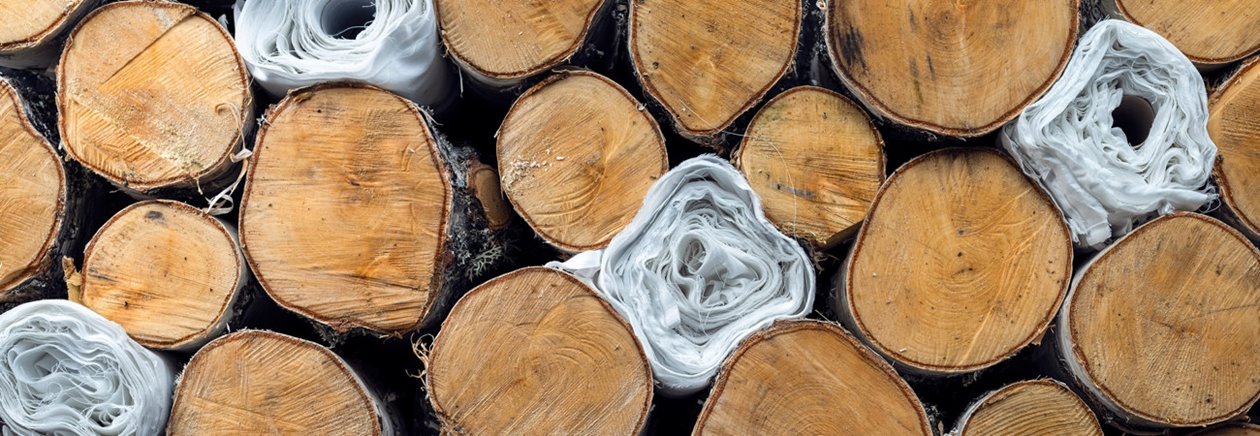White paper: The mission of OnceMore®

Södra has created a unique solution – called OnceMore® – to help creating a circular textile industry. Read about the challenge, the solution and the way forward in our white paper.
The fashion industry is one of the major polluting industries in the world. More than 100 million tonnes of textile fibres are produced every year. Virtually everything manufactured is derived from virgin material and in 2030 is more than 70 percent estimated to come from fossil-based material. 50 percent of all textile production is clothing, and nearly nothing – less than 1 percent – is recycled. The end-of-life textiles are instead sent to landfill or incineration, which is costly and harmful for both the environment and the climate.
But a shift could be coming to the textile business. Big brands have started to implement circularity models and are keen to develop them.
Södra has created a unique solution – OnceMore® – to this challenge. It is the world’s first process for recycling textile waste from blended fabrics in an industrial scale. Large volumes can be used to make new clothing and textiles. We combine cellulose from wood with used textiles to make a dissolving pulp that is ready for use in the production of new textile products.
We use post-consumer waste which normally would be thrown away. It could be used bed sheets, tablecloths, or towels. We use items with a blend of cotton and polyester which has been impossible to recycle efficiently until now. But now, we treat them to get pure cellulose and combine it with cellulose from wood taken from our responsible managed forests in Southern Sweden. This result in a new raw material of high quality, ready to re-enter the textile value chain.
With this process, textiles can finally enter the circular bioeconomy, in a sustainable, large-scale and long-term way.
The challenge
Since Södra launched OnceMore®, the message from the brands has been clear: They want volumes now and the market to act. The brands don’t have the production inhouse. They rely on companies from the whole value chain to embark on the mission together and work towards the same goal: To disrupt and shift an entire polluting industry. There are multiple challenges ahead to reach our collective mission. Södra have a solution to the problem, but it could not be the only one. The entire lifespan of textile needs to be disrupted – from the production to the consumer.
Over time, natural resources will not be able to meet the growing demand for virgin fibre. Clear extended producer responsibility for textiles is part of the transition to a circular economy, but additional policy instruments and initiatives are also needed – political, sector-wide and cross-sector, as well as consumer-driven. The goal must be to reduce the inflow of new, unsustainable, fibre in textile supply chains.
In our view, we are on the brink of many solutions and technical breakthroughs in the textile industry that will enable circular flows, and that could be accelerated and strengthened with policy instruments.
The solution
We believe that international agreements and a joint regulatory framework are required to solve the challenges faced by the global textile supply chain. This is key to restructure the industry and pave the way for a more sustainable future. We need a regulatory framework that disengages linear textile flows and connects circularity with profitability. This must be made by three key stakeholders.
- First: The legislators must act.
A bonus-malus system should be introduced to push the use of recycled fibres and reduce the use of non-sustainable materials on the market. It will support the industry to reach a needed level of circular textiles.
- Second: The producers must act.
Already at the design stage circularity must be considered. Products should be long lasting, both in terms of durability and design. The producers must work towards the change from fast fashion to endless fashion. Materials must be recyclable and avoid complex blended materials.
- Third: Help the consumers to act.
It needs to be easy for all of us to take conscious decisions. Implementing a simple and joint labelling system, would make every value chain transparent.
The conclusion
More than 100 million tonnes of textile fibres are produced every year. Virtually everything manufactured is derived from virgin material and very little will be able to recycle due to lack of traceability. To change this trend, we need to act on multiple levels. There are no major commercial systems for recycling textiles at present. This must change.
By developing OnceMore® and the production, Södra is contributing in one way. The target is to add 25,000 tonnes of textiles to the company’s pulp production by 2025.
We believe that Södra’s innovation can be a global game changer. It has never been possible to recycle blended fabrics on such a large scale before. Södra is first in the world and, in addition to polycotton, will also be able to accept viscose and lyocell.
To manufacture this new product on a large scale, we are seeking partnerships with companies that have high sustainability ambitions and would like to contribute to the delivery of sustainable textiles.
This is our contribution to making the textile industry circular. But there is a long way to 100 million tonnes. We need to change the fundamentals; the way we treat textile waste today and the way we design for circularity. We can’t do that in one day, but we'll try.
For more information or requests, please contact:
Johannes Bogren,Vice President, Södra Cell Bioproducts
Phone: +46 340 63 34 15
Email: johannes.bogren@sodra.com
Show all content for topic
Subjects: Forest owners
